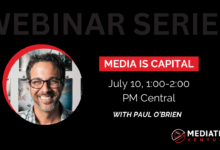OMG Startups: Earning an Investor is the Same as Earning Media

Next week, for Austin Startup Week, I’m hosting Austin American-Statesman Technology writer and I Love You So Much podcast host, Omar Gallaga, Melinda Garvey, Magazine Publisher and Owner, ATX Woman, and Storytelling for Entrepreneurs’ Lyn Graft, Film and Video Producer, in a discussion of the role of media in tech (RSVP HERE). We wanted to put together an atypical panel for entrepreneurs; rather than just reporters for a press panel, producers to talk about media, or some such, we set out to represent a variety of forms of media (print, podcasting, magazine, video, film) to see if we can’t tease out a commonality. Regardless of what we find, next week will be fun.
I share that as it was on my mind this week when 14 startups sent me their pitch decks, cold, asking if I could help them find funding next week.
In that moment, a key tenant of finding support as an entrepreneur stuck me – That the approach to reaching the media is essentially the same as the approach to reaching investors.
Whoa. Is it?? I pondered…
Think about it… and let’s not just consider startups in the conventional sense that you might think of them… there is a consistent in any substantial success, be that a musician, a film, a video game, a book, a mobile app, or a new technology and likewise, the pattern seems to hold true in the opposite sense: that entities that struggle with the media ALSO struggle with garnering capital. Successful entrepreneurs garner BOTH media attention and funding and financing.
Is that a causation? Does one beget the other?
Is there a correlation?
Or is it something far simpler to appreciate: that your approach to both is essentially the same and thus if you’re not succeeded in this regard, perhaps you need to take a different approach.
Reaching the News Media and Investors
 I can speak from both sides of that question. In my past, I’ve successfully engaged investors and the press at times that it mattered. Likewise though, I’ve failed to engage them appropriately at times that I desired. One such case is fresh in my mind as in our recent news of the Startup Studio that we’ve developed with Galvanize, I personally neglected to introduce the journalists I’d hoped to earn support from for no other reason than not leading them with ample time and information.
I can speak from both sides of that question. In my past, I’ve successfully engaged investors and the press at times that it mattered. Likewise though, I’ve failed to engage them appropriately at times that I desired. One such case is fresh in my mind as in our recent news of the Startup Studio that we’ve developed with Galvanize, I personally neglected to introduce the journalists I’d hoped to earn support from for no other reason than not leading them with ample time and information.
Note what almost never works: you a do press release at the time you want new coverage. Have you ever tried to raise money and just sent a pitch deck when you need money?
Here’s what works
- Is there an outcome that will deliver an ROI?
- Do you have the people that can deliver that? What’s their story?
- Do people care? Partners, customers, etc.
- Start the conversation now. Over coffee. Essentially (by which I mean both simply and in as covering the essentials)
- Learn what they need from you so that they might support you
- Go deliver on those promises
- Provide them details when it’s time for the news/funding
Wait a minute Paul…. what about needing an MVP, or the business plan, or the validation, a demo video, a portfolio, or any of the many other TACTICAL things we hear we need to get funding/news coverage??
If you haven’t laid a foundation with those from who you need support, those distinct deliverables won’t make any difference.
Expect a 3 to 6 month runway.
That’s the amount of time you should expect to spend merely developing that foundation so that when you are prepared for investment, a label, or news coverage, you might actually get it.
Let’s run through each of those 7 steps in some detail…
1. Is there an outcome that will deliver an ROI?
Brass tacks: potential investors and journalists have a job. They’re not there of their personal passion to handle everything. News doesn’t mean everything is reported and Funding doesn’t mean everything gets it. Music Labels and Film Producers don’t sign everything. Ever, that’s not their job. The question you should have worked out before even setting out as an entrepreneur (get that? BEFORE YOU EVEN FILE AN LLC OR PLAY A GIG), is HOW what I’m doing deliver a return on investments.
Both venture capital investors and media professionals are INVESTING their time, experience, network, and reputation in you when they help. Is there a return on investment that they’ll receive?
This first point is incredibly simple, all too often overlooked, and the first of your priorities for a reason: if you CAN’T/WON’T deliver an ROI (Return on Investment), set out on your venture with other means in mind of getting capital and attention!
Will your work result in value for them? If the answer from the get go is no (and they’re is absolutely nothing wrong with that being the answer), set your plans down a different path to success that doesn’t require investment.
2. Do you have the people that can deliver that? What’s their story?
One of the core tenants of startup success is that it’s all about the Team. Same is true of any media endeavor is it not? If you don’t have the designer, sound engineer, director, and editors that result in a great film, you’re not likely to result in a great film.
What’s the story that both journalists and capital investors want to hear? That you are the team that will succeed.
Think about it in that that validates that you can deliver that ROI.
If you’re a startup without a CMO that has some experience in what you’re doing – how are you going to compete??
If you’re a video game developer without an artist and passion for your niche – how appealing will the game really be??
The investor wants to know the people involved and that they are capable and passionate about what you’re doing. Likewise, the journalist, or more accurately THEIR audience, wants to hear the stories of that team – the people.
3. Do people care? Partners, customers, etc.
Now, in priority 3 – the THIRD priority, not the first! – we get to the consideration that frustrates almost everyone I meet. “I HAVE customers/fans, why won’t anyone fund me???”
Inevitably, because while you have customers, you haven’t put #1 and #2 first and thus there are other reasons you can’t garner the support you expect.
Having done that though, can you show evidence from the market that people love what you’re doing? If you can’t – why would a journalist want to tell your story to people?? Why would an investor risk their money in a venture with no evidence that people care??
4. Start the conversation now. Over coffee. Essentially (by which I mean both simply and in as covering the essentials)
No pitch deck. No press release. We’re still WEEKS in advance of you actually getting support from these professionals.
Take them to coffee. Treat people like people and not machines behind an email address. Develop friendships (nee, partnerships)
Simple and Essential, “Hey, I’ve set off to…. and in a few weeks/months, I’m hoping WE can developing something… here’s what we’re doing… what do you think?”
5. Learn what they need from you so that they might support you
Notice how we ended #4 with an open ended question. Not a request for support! Not an ask and expectation!
“What does what we’re doing mean from your point of view?”
You’re going to get a litany of feedback ranging from “neato” to “that’s never going to work” to “I don’t know that we’d be able to help but have you talked to so-and-so” to “brilliant! If you can get X, Y, and Z figured out, let’s talk again in a few weeks!”
They’re going to help. Even in saying NO they’re helping as they’re showing you how what you’re doing MIGHT be wrong. Key word there: MIGHT. Truth be told, they don’t any better how to succeed in what you’re doing than you might, they aren’t RIGHT, they have a perspective. Take it for what it’s worth but take it.
6. Go deliver on those promises
What you take from that is that they’ve helped you determine a road map for what you need to do to deliver on their need for a return on an investment. Maybe they think you need a partner, or someone else on the team. Maybe you need more fans. Maybe they can’t even help themselves but they offered another connection that might…
Remember, their feedback isn’t necessarily right for you! They may say that you need a mobile app and you completely disagree. Great! Maybe they’re right while we might find that you are. This is entrepreneurship for a reason and we’re all taking risks as we explore new ground.
Work out the promises you want to keep in this new relationship you’ve developed, keep them apprised, and WHEN their support is more formally needed, you’ve both reached a point where you’re investments manifest together.
7. Provide them details when it’s time for the news/funding
The press release.
The pitch deck.
WEEKS OR MONTHS later.
And even then, you’d best not hope for something tomorrow. Now we’re just starting the process of getting an article written, exploring funding/financing what you’re doing, or hosting you for an interview in the studio.
It’s only now that you have a relationship such that the deck/release has any meaning to your relationship and all you’re sending at this point are the details – not the facts of the matter.
As I look in my inbox, I’m realizing that I’d relish just one note that says, “Hi, we’re doing something that might be interesting to your work and in a few months, we’re going to start raising capital / promoting our event. Do you have time for lunch in the next few weeks?”
Yes. Let’s start something amazing together!







Great piece, Paul. Very sensible approach and I find myself making some of those mistakes. Thanks the insight and reminders.
Love this analysis, Paul. It’s the little things like treating others as people and not “money trees” that truly goes a long way.
Great advice Paul!
There really ought to be a class for novice startup founders that teaches them nuances like this. Nice that you’re giving them advice, but is it getting to them?
I think the challenge is there are many things that claim to be classes teaching this…. incubators, SBDCs, advisors, etc. and most of what they’re teaching is crap or biased to their agenda. Heck, let’s be realistic, my posting this is tied to my agenda too it’s just that my agenda is rather transparent – people know what I’m do, the content is freely available, etc.
So it’s not that it’s not getting to them, it’s that novice startup founders are hearing so many mixed messages and gravitate toward the perception of what will give them what they need – regardless of if the direction given is actually any good.
Harold Hughes, how timely, this was exactly our pep talk this morning. Thanks again btw!
Haha that’s crazy
I agree more with you than you do with yourself